(a) “A-Frame or Sandwich Board Sign.” A sign made of wood, cardboard, plastic, or other lightweight and rigid material having the capability to stand on its own rigid supporting frame in the form of a triangle or an inverted V and being portable and movable. Also known as a Sandwich Board sign.
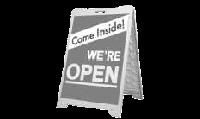
(b) “Awning Sign.” Any hood or awningmade of cloth, metal, flexible plastic, or vinyl or withmetal frames attached to a building without ground mounted support.

(c) “Bulletin Board.” An announcement signwhichdirectsattention to and is located on the lot of a public or semipublic institution.
(d) “Canopy Sign.” A sign attached to the soffit or fascia of a canopy, covered entrance, or walkway.

(e) “Changeable Copy Sign.” A sign designed to display multiple or changing messages whether by manual, mechanical, or electronic means. Such signs are characterized by changeable letters, symbols, or numerals that are not permanently affixed to the structure, framing, or background, allowing the letters, characters, or graphics to be modified from time to time manually or by electronic or mechanical devices. Electronically changed signs may include either electronic message boards or digital displays and are defined separately.

(f) “Dilapidation.” Dilapidation includes any sign where elements of the sign area or background have portions of the finished material missing, broken, peeling, or illegible; where the structural support is visibly bent, broken, dented, rusted, peeling, corroded, or loose; or where the sign or its elements are not in compliance with the adopted electrical code and/or the building code.
(g) “Directional.” A sign indicating a direction or a location to which traffic, whether pedestrian or vehicular, is requested to move within the parcel for the purpose of traffic control and public safety.
(h) “Electronic Sign.” A changeable copy sign for which the text, letters, numbers, pictures, or symbols forming the informational portion of the sign consists of flashing, intermittent, or moving lights, including any LED screen or any other type of video display. This definition does not include signs that have internal or indirect illumination that is kept stationary or constant in intensity and color at all times when such sign is in use or any government sign located within the right-of-way that functions as a traffic control device and is described and identified in the Ohio Manual of Uniform Traffic-Control Devices.
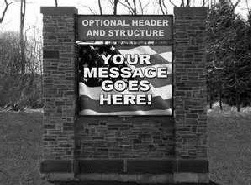
(i) “Free-Standing Ground Sign.” A stationary sign which is not affixed to a building or supported by a pole or poles. It may be supported from the ground by means of a free-standing wall, monument, two or more support posts at the outside edge, or other structural support system.
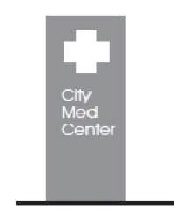

(j) “Marquee Sign.” A sign attached to the soffit or fascia of a marquee, to a roof over an entrance, or to a permanent awning.
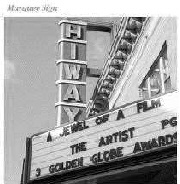
(k) “Permanent Sign.” A sign permanently affixed or attached to the ground or a structure and which cannot be removed without special handling, such as removing or dismantling the foundation or a portion thereof, fasteners, adhesives, or similar materials providing support or structural integrity for the sign.
(l) “Pole Sign.” A stationary two-face sign erected on a pole or poles that is wholly independent of any building for support. The faces shall be back-to-back and shall not be more than a foot apart.
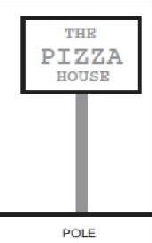
(m) “Projecting Sign.” A sign that is attached to the wall of a building and is perpendicular to the flow of either pedestrian or vehicular traffic and has a leading edge extending more than twelve inches beyond the surface of the building.

(n) “Roof Sign.” A sign placed, inscribed, or supported upon a roof or upon any structure which extends above the roof line of any building.
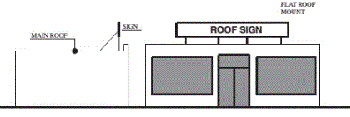
(o) “Sign.” Any display, figure, painting, drawing, placard, poster, or other device, visible from a public way or adjoining property, which is designed, intended, or used to convey a message, advertise, inform, or direct attention to a person, institution, organization, activity, place, object, or product. It may be a structure or a part thereof or it may be painted on or attached directly or indirectly to a structure, material, or object. It may be painted on stone or be formed out of shrubbery.
(p) “Sign Area.” Sign Area for a Freestanding Ground Sign is the space enclosed within the extreme edges of the sign for each sign face, not including the supporting structure. Sign Area for a Wall sign, where it is attached directly to a building wall or surface, is the space within the outline enclosing all the characters of the words, numbers, or design.
(q) “Sign Face.” The entire display surface area of a sign upon, against, or through which copy is placed.
(r) “Suspended Sign.” A sign that is suspended from a canopy or along a pedestrian arcade that would exist without the sign.
(s) “Temporary.” A banner, pennant, poster, or advertising display constructed of paper, cloth, canvas, plastic sheet, cardboard, wallboard, plywood, or other like materials that appears to be intended or is determined by the Zoning Administrator to be displayed for a limited period of time.
(t) “Wall or Panel Sign.” A sign integral with the exterior face of an exterior wall of a building, or attached to the wall or parallel with the wall.
(u) “Window Sign.” A sign painted, attached, or affixed to the interior or exterior surface of a window or door of a building.
(Ord. 2022-42. Passed 10-5-22.)